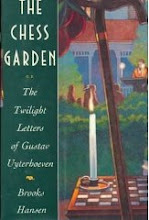Modo
remained, scanning the chiseled, gridded, squared-off landscape of brick,
concrete, steel, and glass that jutted and spanned and canyoned below. They’d
passed over a number of small villages and settlements on the way here –
distantly, of course. Still, from the vantage of the clouds it seemed like the
men were much the same as before, sending their little trails of smoke into the
sky. In fact that image of them – cold and shivering, stomping and huddling
around the golden glow of their various hearths – more or less emblemized them
in the Great Wyrm's mind. That was the good and the bad of them, how basically
naked and ill-equipped they were, and yet, because of that, clever; the only
other creature to master fire, if you could call that mastery, with sticks and
flint and the coaxing and feeding and taming. But that was the point – the seed
of admiration tucked away inside the husk of his contempt – that man had to
work so hard, so constantly, so creatively to manage what Modo already had
within him, and could summon up with mere intention, literally as easily as he
could breath. That was the difference.
And
here was that same difference again, splayed out beneath him in this impossibly
ornate cityscape. If the villages hadn't changed much, the city was
transformed. It was much better lit than he recalled. All the little globes
they’d posted along the walkways appeared to be beaming a new kind of
light: hollower – slightly cheap, it
seemed to him – but also lovely in its way. Incandescent. It didn’t flicker so
much as hum. Everything hummed and strained – the carts all rumbled now, and
puttered and grunted along, some of them on wheels of their own, some guided
along tracks, so clumsy and awkward, with gangly arms attached to more humming
wires overhead. The streets were latticed with them like cobwebs
There
was almost something endearing about it, the lengths to which they’d go just to
be carried along, the effort they dedicated to expending no effort, and the
price they were willing to pay. The stench was everywhere – of gas, smoke, and burning
air. Across the water, the stacks were much bigger and taller than he’s seen
before, chugging great plumes of dark smoke into the sky. But again, to what
end such industry? Leisure?
He
quieted his mind to listen, to see if he could hear a difference, for this was
another of his gifts: to hear however
much or however little he chose; each lap of each wave in the river; or past
these, and past the humming and buzzing and chugging to the human's voices,
their laughter, their shouts, their whispers and inner voices – every thought
if he so desired. Had that changed at all, or was the din the same as ever? It
seemed to be, only more loud perhaps, more of it, more closely packed together.
He heard the squabbles and the prayers, the pleas, all the same as he
remembered.
Then
suddenly and out of nowhere – or not out of nowhere, as it was coming from
directly underneath him – a most profound and majestic sound, a driving, driven
hum which caused the stones to tremble, and that same trembling to rise up
through his body, to cause his wings to quiver, his skull to purr. The charge
was all throughout him, and now the sound was joined by human voice, a
chorus-full, diving and cascading, rising again. He thrilled. Of course he did.
He pitied them no more than they deserved. They were filthy, yes, but also
capable of this, this glorious sound, borne of a knowledge they possessed that
he did not – those lights, those muttering wagons, and whatever it was that had
humbled the man so quickly, the father. Was that his genius as well? And was
this song below the sound of that?
Only
now there came another sound, a counterpoint – a lone voice, climbing up the
spiral stairs, wheezing and grunting to the music, as if to remind the wyrm
again of just how paltry, how sniveling, and disgusting they could be; this one
griping about the gout in its knee. Modo turned round to see him appearing in
the door – lumpy and white and trembling, standing on the parapet, looking back
at him, his back flat against the wall. Modo lifted one wing just barely, just
to see the terror in his eyes.
Away!
He
jetted a hot plume of smoke from his nostrils:
the tower was his now. When the smoke cleared, the man was gone,
tripping back down the steps, gimpy knee or no.
Oh,
they were the same, thought the Great Wyrm, the same as ever, just more so, and
there were more of them, packed more tightly, more frightened, more angry, more
desperate. More more more, but there again, wasn't that the point. Say what you
will about the rottenness of their cores, they were thriving, living and dying
in untold numbers, while his own kind had whittled down to how many now? Was it
just the one?
He
would have to find that stone.














